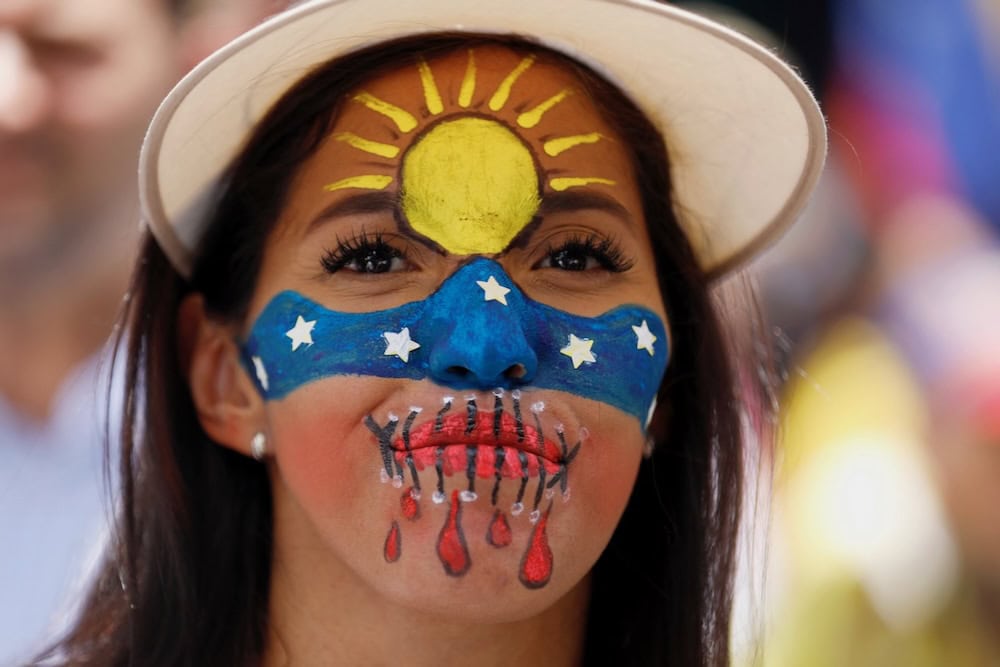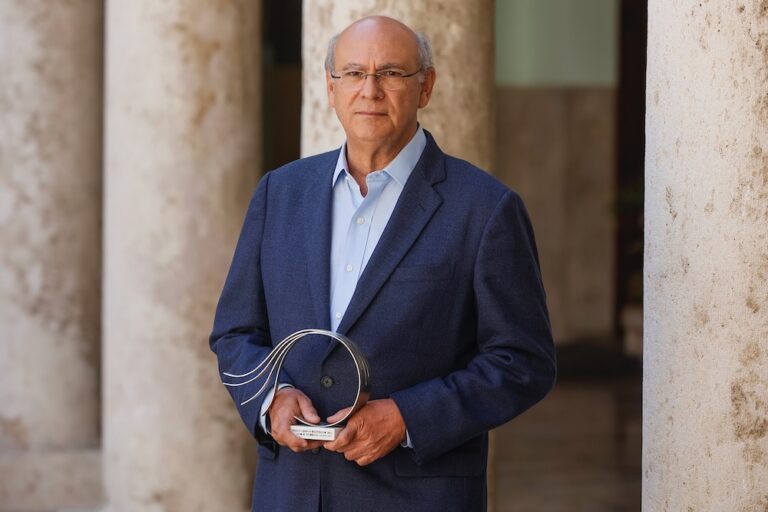August in the Americas: A free expression and civic space round-up produced by IFEX's Regional Editor Laura Vidal, based on IFEX member reports and news from the region.
In Venezuela, the aftermath of the presidential elections has seen heightened repression, with severe crackdowns on protests, intensified media censorship, and new laws that threaten civil liberties. Meanwhile, Uruguay’s recent legislative changes present a significant risk to freedom of expression, weakening protections against media concentration and reducing oversight. Across the Americas, journalists continue to face threats, from arrests during protests in the U.S. to the ongoing persecution of Guatemalan journalist José Rubén Zamora and new attacks against El Faro coming from the president in El Salvador.
Venezuela: The wave of violence grows and accelerates
The aftermath of Venezuela’s July presidential elections has marked a new chapter in the country’s political crisis, with severe repercussions. Twenty people have been killed, and political opponents of Nicolás Maduro, whose re-election has been strongly contested domestically and internationally, face growing repression. The opposition, led by Edmundo González Urrutia and María Corina Machado, demanded greater transparency in the electoral process, particularly the publication of original tally sheets. Despite their efforts, these documents remain to this date unpublished, fueling further unrest.
As protests erupted across the nation, the government’s response has been described as the harshest yet. Over 2,000 demonstrators have been detained according to the government – including underage people and people with disabilities– sent to common prisons, which are already overcrowded and facing numerous human rights violations, far from their homes, and denied legal representation after being accused of “terrorism”.
The press, already under heavy attack during the electoral campaign, has faced greater repression amid the ongoing political crisis. Journalists have been forced to flee the country, some walking across borders to escape persecution. IFEX member Espacio Público reported 13 journalists arrested.
A statement by the Inter-American Commission on Human Rights’ Special Rapporteurship for Freedom of Expression (SRFOE) was one of several alerts to the international community regarding the escalating repression, as well as “State terrorism practices”, which has included raids, marking people’s houses with “X” in certain neighbourhoods, media closures, equipment confiscation, and the deportation of the international press. Journalists, activists, demonstrators and other Venezuelan citizens have seen their passports suddenly annulled. Authorities have also shared videos of arrests on TV and social media, aiming to intimidate potential protesters.
The result has been a climate of fear, forcing journalists and people in general to take extreme security measures, such as limiting their social media activity and avoiding coverage of sensitive topics.
Journalists have received threats from mayors, governors, and pro-government groups (known commonly as “colectivos”). Lists containing names, photos, and personal information of opposition leaders, polling station members, and journalists have circulated, facilitating their detention. Public officials have increasingly stigmatised journalists and independent media, labelling them as “coup plotters,” “right-wing operatives,” and “terrorists” financed by foreign interests. The secretary general of the National Union of Press Workers (SNTP), Marco Ruiz, warned that Venezuela is now under an undeclared curfew that threatens to dismantle journalism in the country.
To mitigate risks, some journalists have turned to AI-generated figures to report verified information, corroborated by independent media.
However, these and other efforts face ever-growing challenges. A feared law that could fully close Venezuela’s civic space was approved on 15 August. Just before the elections, the IFEX-ALC network had joined other civil society networks to warn of the law’s devastating effects. This legislative development was followed shortly after by the creation of the National Cybersecurity Council, which can request information related to the country’s cybersecurity from public or private entities. According to reports, the Venezuelan government announced the council’s creation by decree, aiming to establish a permanent surveillance network.
Technology has played a central role in facilitating this crackdown. There has been a significant deployment of Venezuela’s surveillance and control apparatus, built up over the last 15 years. Security forces have monitored social media closely, urging supporters to report any dissident activity online. This has led to arrests, home and office raids without warrants, and the denial of fair trials for those detained. These individuals are said to be sent to “reeducation centres,” where, as Maduro has stated, “there will be no forgiveness.” This crackdown is also part of what has been known as “Operación Tun Tun” (Operation knock-knock), which uses platforms like Instagram, Telegram, and X (formerly Twitter) to dox dissidents, including activists, journalists, and regular citizens who served as polling station witnesses.
In some cases, this doxing is done by their own neighbours, encouraged by the government.
Public officials have accused social media platforms of being “amplifiers of hate,” promoting laws that label online regime critics as “fascists,” “neofascists,” or “cyber-fascists.” The government has blocked at least 107 websites, including 63 media outlets and 9 human rights platforms. X was blocked for 10 days after Maduro accused its owner, Elon Musk, of using the social network to “promote hatred”. In public appearances, Maduro announced “breaking relations” with WhatsApp, saying it shared “a list of all Venezuelans with Colombian drug traffickers” and encouraging people to join Telegram and WeChat – which can be less than safe for sensitive information. It can only be assumed that one of the goals of such a move is to stigmatise the use of the app, which is the most popular among Venezuelans for communicating locally and with those abroad (around 9 million Venezuelans have migrated since the start of the economic collapse); and thus break the networks of communication and trust that have been created so far, normalising mistrust and fear.
Uruguay: A step backward
Over four years after President Luis Lacalle Pou’s administration proposed to repeal the “hyper-regulatory” media law, Uruguay has taken a significant step backward in terms of freedom of expression. IFEX-ALC together with other regional networks defending freedom of expression have expressed strong concern and opposition to the new law.
The revised law, which excludes digital media, has cut the number of articles by half. Terms like “monopoly” and “oligopoly” have been removed, as well as the designation of the radio spectrum as “a common heritage of humanity.” In their place, a new article mandates that media provide “impartial,” “serious,” and “balanced” political information.
According to local organisation and IFEX member Cainfo, “this reform represents a significant setback in human rights, establishing a regulatory framework contrary to inter-American freedom of expression standards. Among its consequences are “increased media concentration, legalisation of obscure contexts for several media groups, a push for foreign ownership of the media, and the elimination of public participation and citizen control in the allocation of frequencies.”
In a statement signed by IFEX-ALC and other regional networks defending freedom of expression, it was emphasised that this development occurs in an electoral context, less than five months before general elections to choose a new government. The timing poses negative consequences for democratic debate, access to quality information, and the free exercise of journalism.
The Special Rapporteur for Freedom of Expression of the Inter-American Commission on Human Rights previously stated that the reform “could imply prior censorship and impact media concentration, transparency, and citizen participation.” Regional and international organisations view this legislation as a regression in human rights and freedom of expression, two areas where Uruguay has traditionally stood out compared to its neighbours in the region and the challenges they face.
In brief
In welcome news, Colombian president Gustavo Petro will establish a communication channel with IFEX members Reporters Without Borders (RSF) and the Foundation for Press Freedom (FLIP). The president pledged to take firm action on violence against journalists and promised a direct communication channel with these organisations for quicker responses to serious cases.
El Salvador’s President Nayib Bukele has once again targeted the investigative outlet El Faro, this time for publishing reports exposing mismanagement of funds during his administration.
ARTICLE 19 Mexico and Central America reported on ongoing human rights abuses against political prisoners in Cuba, including denial of healthcare, unsanitary conditions, prolonged isolation, and restricted contact with families.
RSF condemned the arrests of at least three credentialed journalists covering protests during the Democratic National Convention (DNC) in Chicago. It called for all charges to be dropped, stating that police in Chicago and across the United States must respect journalists’ right to report safely and without interference during election-related events and protests.
Guatemalan journalist José Rubén Zamora, in prison since July 2022, was granted house arrest for one of the charges against him. However, he remains in prison due to another ongoing charge. The political and judicial situation in Guatemala continues to draw national and international concern over threats to the rule of law and judicial independence.



